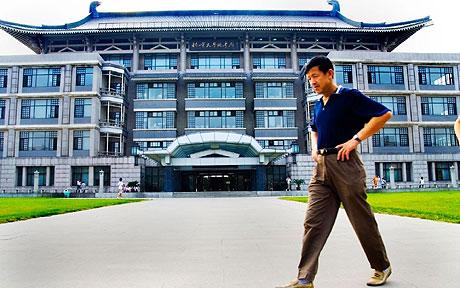【中文标题】中国:人才极度流失?
【原文标题】China: The Ultimate Brain Drain?
【登载媒体】英国每日电讯
【原文作者】Peter Foster
【原文链接】http://www.telegraph.co.uk/news/worldnews/8080644/China-The-Ultimate-Brain-Drain.html
中国的北京大学矢志成为一所比肩于牛津、剑桥、哈佛、耶鲁的世界级学府。

世界级的学府吗?北京大学的图书馆建筑。
草坪还没有铺好,三根光秃秃的旗杆伸向天空。但是第一批研究生已经搬进了北京大学为外国学生新修建的宽敞、闪亮的公寓楼。
一位外国博士生说:“这里就像一座酒店,每个房间都有单独和卫生间和平板电视。你不得不赞赏中国做事的规模——其它国家应该好好学学。”或许,英国对于首相是否应当审阅资助高等教育的提案的争论,比世界上任何国家来的都多。
在北京大学的校园里逛上一圈,你不由自主地会想到,如果我们想要与全世界竞争,我们就必须找到投资高等教育基础经济的方法。
在过去几年里,英国的大学还在为生存问题苦苦挣扎的时候,北京大学却在大兴土木,这种姿态是对新中国野心的一种响应。
一座崭新的两栋校医院、一个经济研究所,一个MBA中心和一座英语学校仅仅是北京大学十年建设计划的一个开端。这项计划的目标是比肩哈佛、耶鲁、牛津和剑桥,成为世界级的高等学府。
中国丝毫不掩饰大规模发展的野心。它需要能够让自己向经济价值链上游前进的劳动力,不是那些为西方制作小饰品的苦力,而是更加尖端的绿色科技、制药和软件工程领域。
《世界大学新闻》的亚洲编辑Yojana Sharma说:“中国或许和英国不一样,它了解对顶级高等教育机构的投入对未来经济发展有至关重要的作用。中国看到了台湾在90年代的发展过程,现在也在试图步其后尘。这项新的举措意义重大,很多人低估了这个计划的规模。”
教育部承诺会让中国大学中的外国学生人数翻倍,到2020年达到15万人,让中国成为亚洲最大的外国学生学习场所。教育部还在本月宣布要建立一个“符合中国国际形象的”大学网络,并“提升专业品牌”。在将来,学生的简历中教育经历能够和哈佛MBA一样对用人单位产生吸引力。
英国在忙于应付经济疲软期的时候,或许可以得到一些小小的安慰,因为中国的超级大学形象要在十年,甚至二十年之后才会出现,尽管他们距此目标的距离越来越小。
英国议会国际教育情报办公室在今年发布的一份报告中,说中国是一个“对英国形成竞争威胁的对手”,报告预测中国的外籍学生数量会持续增加。
与此同时,赴英学习的中国学生虽然在去年达到5万人,而且给囊中羞涩的英国大学带来了客观的收入,但是在2011年之后这个数字会下降,因为中国的学龄人口因计划生育政策的实施而有所下降。
英国议会的Jazreel Goh说:“报告显示,英国与中国的关系性质必须有所变化,我们需要更加关注相互间的国际化主题。”
有一个现成的例子。6年前在沿海城市宁波建立的诺丁汉大学中国校区在本周获得了一个中国政府的官方身份——“国际科技合作基地”。
在中国教育大跃进的前几年,大部分去中国读书的外国学生需要学习中文,而且大都得到这个国家非常慷慨的助学金的资助。
学生学到了一门对就业有帮助的语言,而中国也得以发展自己的软势力。就像中国教育部所说:“这些都是高质、亲华的外国学生。”
世界一流大学研究中心的Cheng Ying说,这仅仅是中国利用其资源来吸引外国学生就读和中国学生回国的第一步。
Cheng先生说:“中国提升其国际竞争力的关键在于国际性课程和研究项目的设置,尤其是科学和工程专业。”
分析人士认为,中国应当首先吸引优秀的大学教师来国内执教。可以先从香港开始,那里已经有一所世界级高校,然后推广到深圳、四川、北京和上海的顶级高校中。
香港在近期启动了一个国际化的项目,在全球招聘4年制课程的教授,据说最高月薪达到16000英镑。英国的大学必须要准备好迎接这样的挑战。
中国的革命性改变不可能在明天就发生,因为它必须努力克服语言的障碍(即使在中国最优秀的学生中,英文也是普遍的缺陷)、无处不在的剽窃行为、质量低劣的教师,以及依然压制独立思维的中学教育体系。
但是已经有迹象表明改变在悄悄的发生了。这个月,Thomson Reuters的年度调查显示中国将在2011年成为专利数量最多的国家。这表明,中国的工业在政府津贴和强势教育投资的支持下,已经进入了下一个发展阶段。面对这样的挑战,英国无法承受退步的代价。
原文:
China's Peking University is determined to become a seat of world-class learning to rival Oxford and Cambridge, Harvard and Yale.
Seat of world class learning? Library building of Peking University in Beijing
The lawns are not yet laid and three soaring flagpoles stand undressed against a blue sky, but already the first graduate students have begun to move into their sparkling new rooms in Peking University’s vast new accommodation block for foreign students.
“It’s a bit like a hotel,” says one foreigner studying for a PhD, “every room has en suite bathrooms and flat-screen TVs. You have to admire the scale of what China is doing – the rest of the world should take note.” And perhaps nowhere more than in Britain as we debate the merits of the Browne Review on how best to fund our universities.
A quick stroll around Beijing’s Peking University provides a salutary reminder that if we want to compete with the rest of the world, we must find a way to invest in the economic bedrock of its universities.
Over the last few years, while Britain’s universities have been fighting to stand still, the elite Peking University has been resounding to the thump of jack-hammers as it embarks on a building programme that echoes to the ambitions of a new China.
A new, two-wing teaching hospital, an economics faculty, a centre for Executive MBAs and an English language school are only the start of a decades-long plan to rival Harvard and Yale or Oxford and Cambridge as seats of world-class learning.
China makes no secret of the scale of its ambition. It wants a workforce that will drive its economy up the value-chain; out of the low-skill drudgery of snapping together widgets for the West and into the increasingly rarefied fields of green-tech, pharmaceuticals and software engineering.
“China – unlike Britain, perhaps – understands that investing in top-quality university education is essential for its future economic development,” said Yojana Sharma, Asia editor of University World News. “China watched what happened in Taiwan in the 1990s and is now trying to do the same. This new innovation strategy is a major development, and many people are underestimating just how big these plans are.”
The Ministry of Education has promised to double the number of foreigners attending university in China to 150,000 by 2020, making it the largest provider of education to foreign students in Asia. China will also, the ministry asserted this month, establish a university network that “matches its international status” and begin to “forge major brands” that could one day seem as attractive on the CV of a global go-getter as a Harvard MBA.
As Britain embarks on its sober decade, it can perhaps take small comfort from the fact that China’s emergence as a university super-power is still a decade or two away, although the gap is narrowing year by year.
A report by the British Council’s International Education Intelligence Unit this year identified China as a “competitive threat to the UK”, predicting that the numbers of international students in the country would continue to rise.
At the same time, the number of Chinese students coming to the UK – which topped 50,000 last year, providing valuable income for cash-strapped British universities – will start to decline after 2011 as China’s student demographic starts to shrink because of the one-child policy.
“The report shows that the nature of the UK’s relationship with China has to change,” says Jazreel Goh of the British Council, “with a greater emphasis on a shared internationalisation agenda.”
One example of this has been Nottingham University’s Chinese campus, which opened six years ago in the coastal city of Ningbo and this week was given official Chinese government status as an “International Science and Technology Co-operation base”.
In the early years of China’s educational great leap, the majority of foreign students going to China will be learning Chinese, often with the help of attractive subsidies from increasingly generous state bursary and scholarship funds.
The students will pick up career-boosting language skills while China will grow its soft-power network by creating, as the Chinese ministry of education puts it, “high-quality, pro-China foreign students”.
This, says Cheng Ying from the Center for World-Class University, will only be the beginning as China uses its resources to attract foreign students and convince Chinese students overseas to return home.
“The key for China to improve its competitiveness will be in terms of international courses and research, particularly in science and engineering,” says Mr Cheng.
The starting point, say analysts, will be for China to attract the best university teachers, beginning in Hong Kong, which already has a world-class university, before spreading outwards to Shenzhen, Sichuan and the elite schools of Beijing and Shanghai.
In a sign of the financial firepower with which British universities must now compete, Hong Kong recently began an international drive to recruit professors to teach its new four-year degree courses, with the top pay-packages reportedly exceeding £16,000 a month.
The Chinese revolution will not happen overnight as China battles to overcome the handicap of its language divide (good English is a rarity even among elite students), high rates of plagiarism, poorly-qualified teachers and a secondary school system that still discourages independent thought.
But there is already evidence that change is happening. This month, an annual study by Thomson Reuters showed that China will lead the world in patent filings by 2011. This is yet another signal that Chinese industry, backed by government subsidies and strong investment in education, is already stepping up to the next level of development. Faced with this level of commitment, Britain cannot now afford to take a step back. |